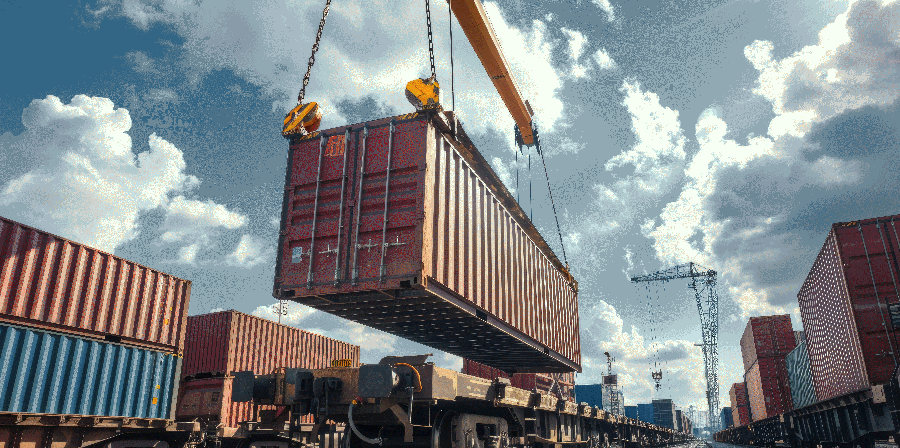Unveil the seamless integration of various transportation modes in the logistics industry. Discover the advantages of intermodal shipping and how it revolutionizes freight transport. Dive into the role of intermodal freight brokers and the sustainability benefits it brings. Discover the cost-effective solutions and increased efficiency of rail transport in this dynamic sector.
Intermodal freight transportation, which combines the strengths of different modes such as rail, trucking, and ocean shipping, has gained significant popularity in recent years. With Jillamy by your side, you can harness the advantages of this innovative approach and revolutionize your freight transport operations.
In this article, we'll look at the benefits of intermodal freight, the growing use of intermodal transportation, and the role of intermodal freight brokers in the industry. We'll explore how these factors impact logistics operations, offering insights for businesses looking to streamline their processes.
The Advantages of Intermodal Freight
Intermodal freight is the use of multiple modes of transportation, such as rail, trucking, and ocean shipping, to transport goods from one location to another. This approach offers several key advantages over traditional shipping methods. It not only combines the strengths of each mode of transportation but also mitigates their individual weaknesses, creating a more balanced and resilient supply chain.
Cost Savings
Intermodal freight offers significant cost savings for businesses. By leveraging multiple modes of transportation, companies can access lower shipping rates and enhance supply chain efficiency. For instance, rail shipping proves more economical than trucking for long-distance hauls. Additionally, the volume of goods moved via intermodal means often empowers companies to negotiate better rates with carriers.
In addition to cost savings, intermodal freight presents an opportunity for businesses to reduce fuel expenses and environmental impact. Opting for rail transport for long-haul segments minimizes fuel consumption in trucking, thereby lowering carbon emissions. Consolidating goods into larger loads for rail transportation reduces the need for frequent trips, leading to additional cost savings on labor and toll expenditures.
Increased Efficiency
Intermodal freight is also known for its efficiency. By utilizing rail for long-distance transportation, companies can avoid traffic congestion and delays that are often seen on highways. This allows for faster delivery times and a more reliable supply chain. Additionally, the ability to plan and schedule rail transport can lead to better utilization of assets and resources.
Furthermore, the use of standardized intermodal containers allows for quicker transfer of goods between modes of transportation. This reduces the amount of time spent in transit and minimizes the risk of damage to goods. The standardized nature of these containers also means that they can be easily stacked and stored, making better use of space in transit and at terminals.
Sustainability
With the increasing focus on sustainability in the transportation industry, intermodal freight has become a popular choice for businesses looking to reduce their carbon footprint. By utilizing rail for long-distance transportation, companies can significantly decrease their emissions compared to trucking. Railroads can move a ton of freight nearly 500 miles on a single gallon of fuel, making them a highly efficient option in terms of energy use.
Intermodal freight also reduces the number of trucks on the road, which can help alleviate traffic congestion and improve air quality in cities. The reduced reliance on trucks helps decrease noise pollution and road maintenance costs, contributing to a more sustainable infrastructure system overall.
The Increased Use of Intermodal Transportation
In recent years, there has been a significant increase in the use of intermodal transportation. This can be attributed to a number of factors, including port congestion and the need for more sustainable shipping options due to fuel costs and emissions. The versatility and adaptability of intermodal solutions make them particularly appealing in an ever-changing global market.
-
Port Uncertainty
Due to various trade tensions and ongoing challenges, such as the collapse of the Francis Scott Key Bridge and issues in the Red Sea and Panama Canal, many businesses are facing unexpected delays and difficulties related to port operations. These situations are beyond their control and can result in increased costs and disruptions for companies. As a result, businesses are looking for ways to improve the efficiency of their cargo handling at ports to ensure faster delivery. Intermodal transportation provides an alternative route that avoids congested ports, allowing goods to reach their destinations without unnecessary delays.
As a result, many companies are turning to intermodal freight as a way to mitigate the risk of port delays when it comes to trucking. By utilizing rail for long-haul shipping, businesses can avoid potential bottlenecks at ports and keep their supply chain running smoothly. Diversifying transportation methods can also protect against regional disruptions, such as strikes or weather-related closures. -
Sustainability and Government Regulations
Government regulations and consumer demand for more sustainable transportation options have also contributed to the increased use of intermodal freight. In an effort to reduce carbon emissions, many governments are implementing stricter regulations on the transportation industry. These regulations often provide incentives for companies that adopt greener practices, including the use of intermodal transport.
Intermodal freight offers a more sustainable option for shipping goods, making it an attractive choice for businesses looking to meet these regulations and reduce their environmental impact. The shift towards a more eco-conscious approach aligns with the broader goals of reducing greenhouse gas emissions and creating a more sustainable future for the logistics sector.
The Role of Intermodal Freight Brokers
Intermodal freight brokers play a crucial role in the intermodal transportation industry. These brokers act as intermediaries between shippers and carriers, connecting businesses with the most efficient and cost-effective transportation options. They understand the nuances of each transportation mode and can blend them seamlessly to meet the specific needs of their clients.
Intermodal freight brokers have extensive knowledge of the transportation industry and can help businesses navigate the complexities of intermodal shipping. They work with a network of carriers to find the best rates and routes for their clients, taking into account factors such as distance, mode of transportation, and cargo type. This expertise can be particularly valuable for companies without a dedicated logistics department or for those looking to streamline their existing operations.
In addition, intermodal freight brokers can provide businesses with logistics solutions and help them optimize their supply chain. They can also handle all the necessary paperwork and ensure that shipments are compliant with government regulations. Their role extends to managing relationships with carriers and handling any issues that may arise during transport, acting as a single point of contact for the shipper.
How to Choose an Intermodal Freight Broker
When looking for an intermodal freight broker, it's important to choose a reputable and experienced company. Here are some factors to consider when selecting an intermodal freight broker:
-
Industry Experience
When it comes to intermodal freight, experience matters. Look for a broker with a proven track record and experience in your industry. They should have a thorough understanding of the transportation industry and be able to provide you with tailored solutions for your business. Brokers with industry-specific expertise can offer valuable insights into best practices and potential pitfalls. -
Carrier Network
A good intermodal freight broker should have a wide network of carriers to choose from. This ensures that they can find the best rates and routes for your shipments. A diverse carrier network also provides flexibility, allowing the broker to select the most reliable and efficient options for your specific needs. -
Technology and Communication
Intermodal freight brokers should have up-to-date technology and be able to provide real-time updates on the status of your shipments. Look for a broker that offers online tracking and communication tools to keep you informed every step of the way. These technological capabilities are essential for maintaining visibility and control over the supply chain.
Why Choose Jillamy, A Trusted Intermodal Freight Broker
In the ever-evolving logistics industry, Jillamy stands as a trusted and experienced intermodal freight broker, committed to revolutionizing your freight transport operations. With a deep understanding of the advantages of intermodal shipping, Jillamy seamlessly integrates multiple transportation modes to enhance the efficiency and cost-effectiveness of your supply chain.
As your dedicated partner, Jillamy leverages its extensive industry knowledge, cutting-edge technology, and strong network of carriers to provide you with tailored and reliable logistics solutions. Whether it's combining rail, trucking, and ocean shipping or optimizing routes and transit times, Jillamy's expertise ensures that your goods reach their destination in a seamless and timely manner.
By choosing Jillamy as your intermodal freight broker, you unlock numerous benefits, including cost savings, increased efficiency, and reduced carbon footprint. With their robust carrier network and negotiating power, Jillamy secures competitive shipping rates, allowing you to optimize your supply chain and maximize cost-effectiveness. Additionally, their emphasis on utilizing rail transport for long-haul shipments not only offers cost savings but also reduces carbon emissions, contributing to a greener and more sustainable future for the logistics industry.
Experience the transformational power of intermodal freight with Jillamy as your trusted partner. Let their expertise guide you through the complexities of logistics, streamline your operations, and unlock new levels of efficiency and cost savings in the dynamic world of intermodal freight transportation.
Conclusion
Intermodal freight offers a number of advantages over traditional shipping methods, making it an increasingly popular choice for businesses looking to streamline their logistics operations. With the rise of port uncertainty and the need for more sustainable transportation options, the use of intermodal freight is expected to continue to grow in the coming years.
By partnering with a reputable intermodal freight broker, businesses can take advantage of cost savings, increased efficiency, and more sustainable transportation options. So if you're looking to optimize your supply chain and improve your shipping operations, consider utilizing intermodal freight for your next shipment.
Contact Jillamy Today
Ready to unlock the potential of intermodal freight for your business? Contact Jillamy, your trusted partner in seamless logistics solutions. With our expertise, cutting-edge technology, and extensive carrier network, we're committed to revolutionizing your freight transport operations. Let us tailor reliable and cost-effective solutions to meet your specific needs, whether it's combining rail, trucking, and ocean shipping or optimizing routes and transit times. Experience the transformational power of intermodal freight with Jillamy by your side. Reach out to us today and discover new levels of efficiency and sustainability in the dynamic world of logistics.


